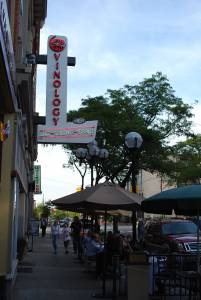Locavore Dining at the 100-Mile Dinner

Brandon Johns, left, buys produce from Mark Wilson of Wilson's Farms at the Ann Arbor Farmers Market earlier this summer. The chef and partner at Vinology is committed to buying local ingredients for the restaurant.
This morning you might spot Brandon Johns at the Ann Arbor Farmers Market around 7 a.m., in Saline’s market a bit later, and up at Brighton by 10 (actually, if you spot him at all three places, let’s hope you’ve got a good reason to be following him around). Since becoming partner and chef for Vinology restaurant in May, Johns has pushed to use as many locally produced ingredients as possible, from radishes and rabbits to peaches and pigs.
On Wednesday, Sept. 24, he’ll put an even brighter spotlight on locavores with a 100-mile dinner – no food allowed from farther than 100 miles away. Most of the food actually comes from within a 25-mile radius of Ann Arbor, Johns says. The only totally non-local ingredients are olive oil, pepper and salt, though “I could probably get Michigan road salt and purify it,” he quips. Uh…no, thanks.
Johns reflects a broader movement to grow or buy food as close to your home as possible. It’s been popularized by the books “The 100-Mile Diet” and “The Omnivore’s Dilemma,” and driven in part by rising food prices, concerns about health and the environmental impact of factory farms.
Johns uses about a dozen local sources for his restaurant, including Tantre Farm, Back Forty Acres, Prochaska Farms, Ernst Farm, Four Corners Creamery and Wasem Fruit Farm, among others. For his sourdough bread starter, he even uses bottled water from Manchester. During the summer, he estimates that 85 percent of his restaurant’s ingredients are local – aside from things like limes and lemons, Niman Ranch beef and Alaskan salmon, for example. For food that’s not local, he says, “we make sure it’s sustainable.”
It’s all about building relationships with the people who run these farms, Johns says. And you have to be flexible – sometimes you can’t get what you’d ideally like, so you need to adjust the menu accordingly. “It takes time, and it takes commitment, too,” he says. He’s also glad that Eat Local Eat Natural has come onto the scene. That business, which started earlier this year, acts as a middleman to supply local restaurants with food produced in this area. (They’re delivering a whole pig to Vinology next Tuesday, Johns says.)
Fundamentally, the locavore movement goes back to relationships. Johns hopes to emphasize those connections at his 100-mile dinner next week – he’s invited several of the farmers whose food he’ll serve, so that diners can meet and talk to them about their work.
“It does help develop that sense of community that’s missing in the world nowadays,” he says.
The menu: Assorted canapes. Heirloom tomato and fresh mozzarella salad, basil oil and chives. Braised rabbit stew with stone-ground polenta, mushrooms and herbs. Roasted pork, sweet corn succotash, house maple cured bacon. Herb and garlic crusted leg of lamb, apple and root vegetable puree, natural jus. Poached pear and goat cheese tart. Each course is paired with wine.
Farms featured: Almar Orchards, Back Forty Acres Farm, Calder Dairy, Ernst Farm, Four Corners Creamery, Garden Works, Jennings Brothers Stone Ground Grains, Kapnick Orchards, Proschaska Farms, Snows Maple Syrup, Tantre Farm, Turk Farms.
Other dinner details: The dinner begins at 6:30 p.m and costs $80 per person, plus tax and gratuity. Make a reservation by calling 734-222-9841 or emailing vinology@vinowinebars.com.





A note about salt and Detroit. I was interested to see that Vinology had a new chef who was committed to local food, but I was somewhat dismayed/annoyed to see the derogatory comments about Detroit “road salt.” The Detroit salt mines have a long history of providing salt for food and although they currently supply salt for roads because that is where the money is, there is no reason they could not supply salt for human consumption. Salt is, after all, salt and the salt in Detroit is just as pure than salt from anywhere else. If enough people contact the Detroit Salt Company to see if they would ever entertain doing small batches of salt for food consumption, those of us interested in local eating could add that to the list of available local food. And even if they won’t provide salt for food, the Windsor Salt Company does sell food grade salt and they are well within the 100-mile limit.
So yes, there is salt in Michigan and certainly within 100 miles.
Cargill Salt has a plant in St Clair, MI, which is (just barely) 100 miles away; they sell that under the Diamond Crystal brand.
Bay City’s Michigan Sugar Company is also just over 100 miles away (101 mi) so you can do locavore sugar if you live on the north side of town.
In regards to the salt discussion, I found it very easy to purify road salt into table salt. I wrote about the experience on my blog.
Some of our Choronicle readers probably don’t realize that the names of commenters are linked to their websites.
Here’s the link to the specific blog post Aren mentions in [4]: http://a2100milediet.blogspot.com/2008/07/homemade-salt.html